Unit 3 Online tours Grammar 课件(共45张PPT)
文档属性
| 名称 | Unit 3 Online tours Grammar 课件(共45张PPT) | 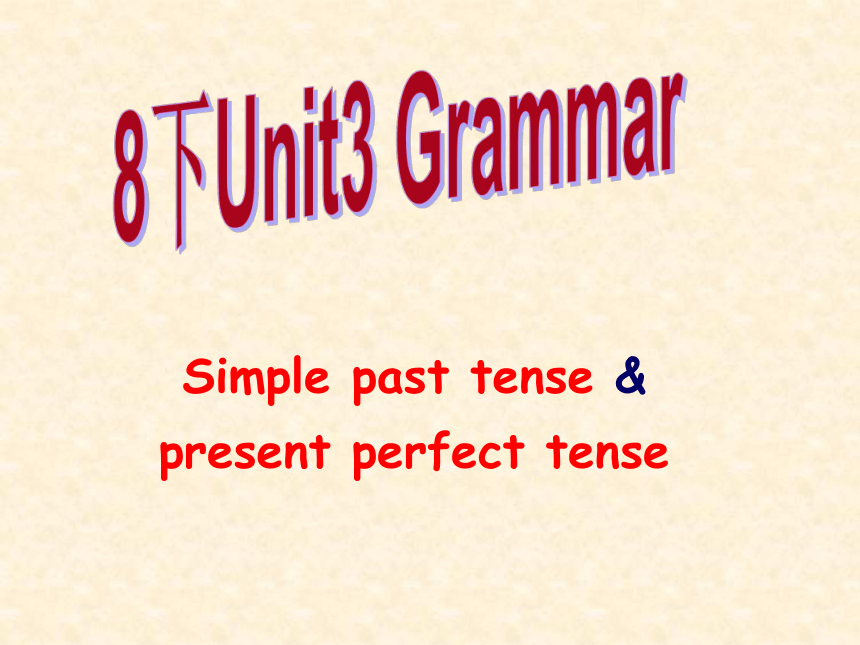 | |
| 格式 | zip | ||
| 文件大小 | 1.2MB | ||
| 资源类型 | 教案 | ||
| 版本资源 | 牛津译林版 | ||
| 科目 | 英语 | ||
| 更新时间 | 2022-03-20 16:04:10 | ||
图片预览

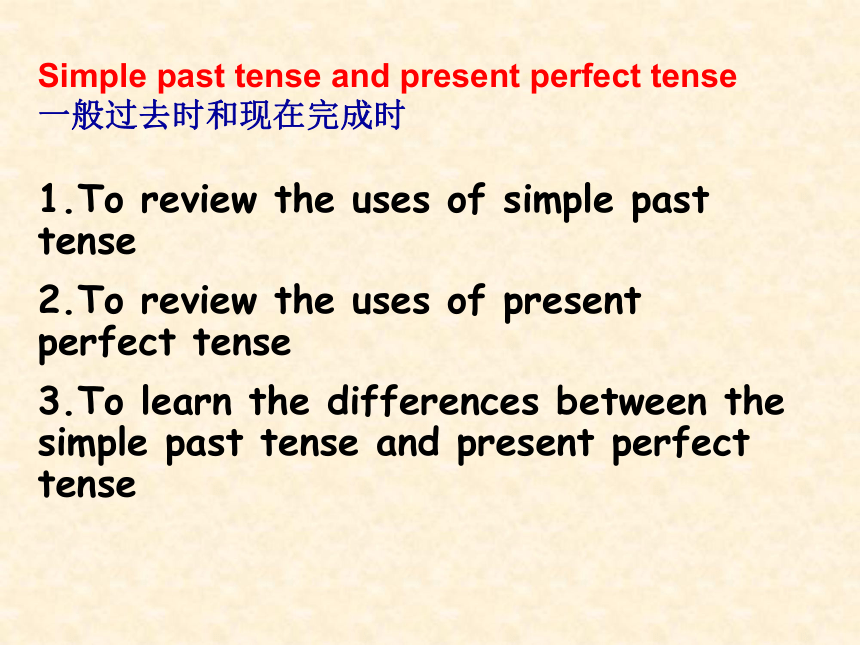
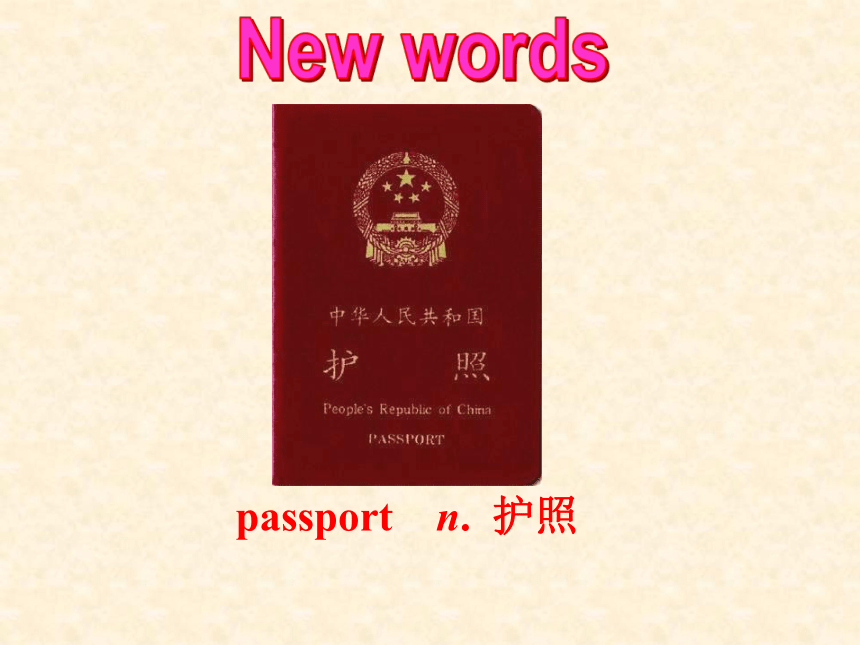

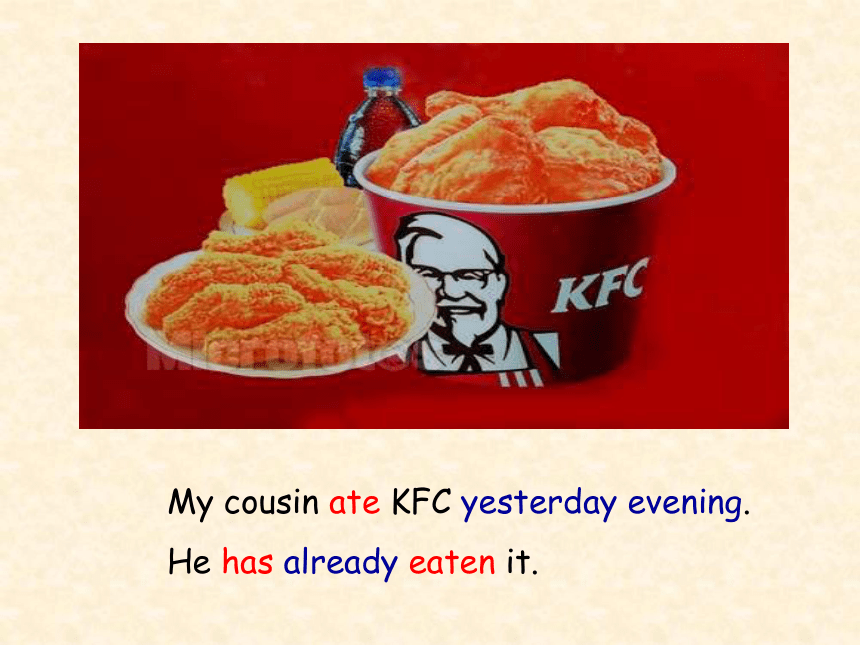



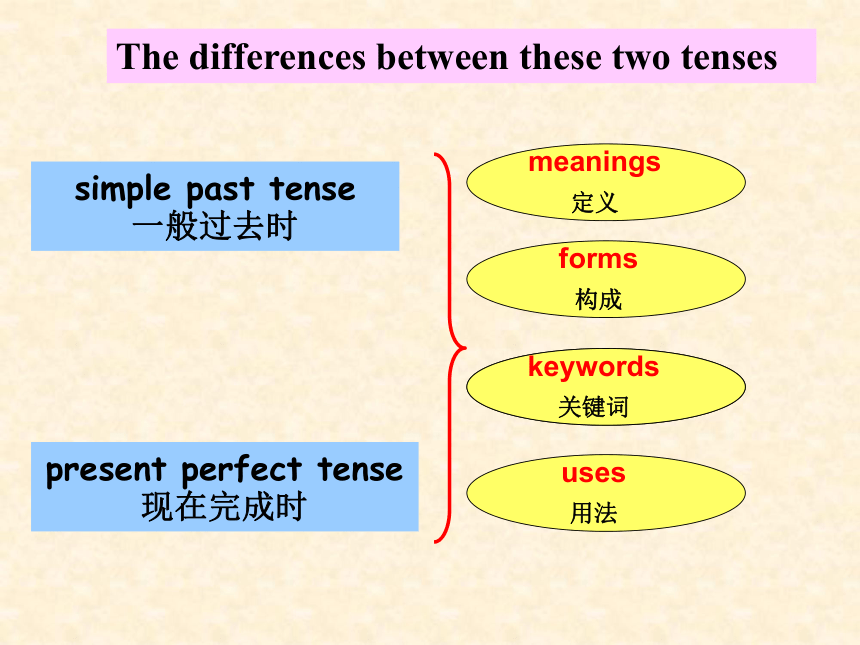

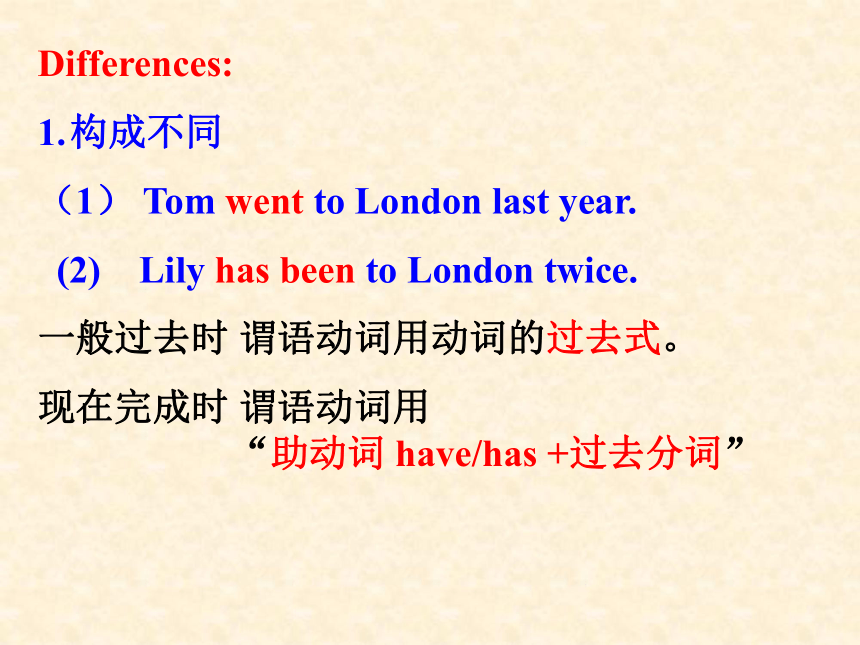
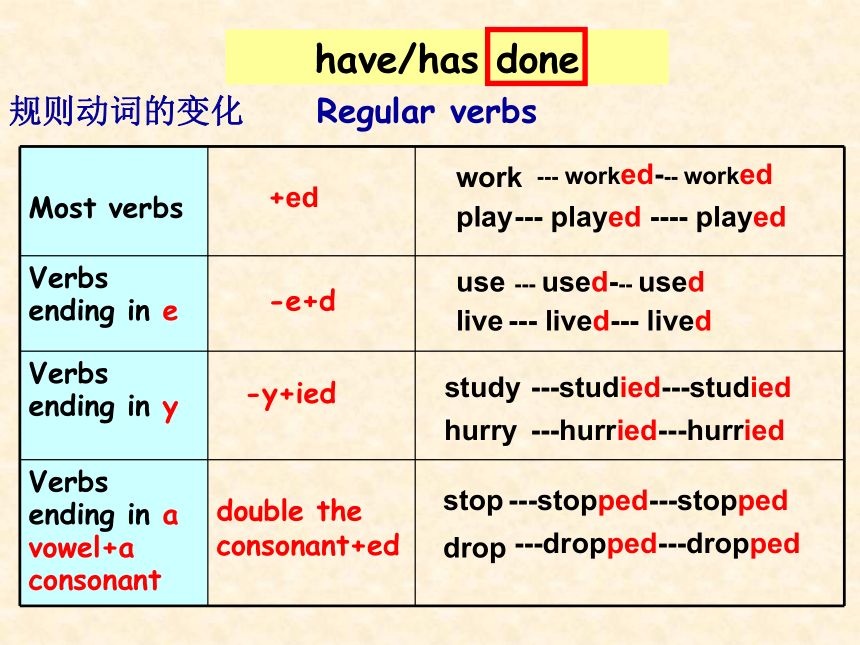
文档简介
(共45张PPT)
Simple past tense &
present perfect tense
1.To review the uses of simple past tense
2.To review the uses of present perfect tense
3.To learn the differences between the simple past tense and present perfect tense
Simple past tense and present perfect tense
一般过去时和现在完成时
passport n. 护照
dream vi.& vt. 做梦,梦想
dream about/of 想象;梦想
e.g. Do you often dream at night
你在夜里经常做梦吗?
I sometimes dream about my parents.
我有时梦见我的父母。
I dream of becoming a teacher.
我一心想当个教师。
自主先学
Read the gramar on Page 134.
My cousin ate KFC yesterday evening.
He has already eaten it.
They got married on March 20.
They have just got married.
We went to Xiamen last year.
Most of you haven’t been there yet.
My cousin ate KFC yesterday.
They got married on March 20.
We went to Xiamen last year.
He has already eaten it.
They have just got married.
Most of you haven’t been there yet.
simple past tense 一般过去时
present perfect tense 现在完成时
The differences between these two tenses
meanings
定义
forms
构成
keywords
关键词
uses
用法
simple past tense
一般过去时
present perfect tense
现在完成时
keywords
关键词
一般过去时表示在过去某个时间发生的动作或存在的状态,也表示过去经常或反复发生的动作。
e.g. He came here yesterday.
2. 现在完成时表示过去的动作(或者状态)对现在产生的影响和结果。
e.g. He has broken the glass.
Differences:
构成不同
(1) Tom went to London last year.
(2) Lily has been to London twice.
一般过去时 谓语动词用动词的过去式。
现在完成时 谓语动词用 “助动词 have/has +过去分词”
Most verbs
Verbs ending in e
Verbs ending in y
Verbs ending in a vowel+a consonant
规则动词的变化 Regular verbs
have/has done
+ed
-e+d
-y+ied
double the consonant+ed
work
--- worked--- worked
play
--- played ---- played
use
--- used--- used
live
--- lived--- lived
study
---studied---studied
hurry
---hurried---hurried
stop
---stopped---stopped
drop
---dropped---dropped
不规则动词的过去分词 Irregular verbs
原形 过去式 过去分词 原形 过去式 过去分词
buy see
do know
eat understand
get take
put teach
go write
make bing
bought
done
did
ate
eaten
got
got
put
put
went
gone
bought
saw
seen
knew
known
understood
understood
took
taken
taught
taught
wrote
written
brought
brought
made
made
yesterday
the day before yesterday
….ago
last week
in October 1st
in 1980
just now
the other day
…
simple past tense
一般过去时
present perfect tense
现在完成时
already
yet
ever
never
just
recently
before
so far
over the years
up to now
once
many times
for
since
…
Key words
I have read this book since 2 hours ago.
I have already read this book.
I have read this book twice.
past
present
I read this book 2 hours ago.
past
present
simple past tense 一般过去时
present perfect tense 现在完成时
一般过去时表示:
过去某个时间里发生的动作或状态,与现在的情况无关。
现在完成时表示:
1从过去持续带现在的动作,可能还会持续下去。
2表示动作已完成,强调对现在造成的结果或影响。
3表示某个动作已经发生的次数。
1. 三年前他养了只猫做宠物。
He ______ a cat as pet three years ago.
2. 这只宠物猫他养了三年了。
He _________ the pet cat for three years.
kept
has kept
1. 我上个星期去参观了那个新动物园。
I _______ that new zoo last week.
2. 我已经参观过那个新动物园了。
I ____________ that new zoo.
visited
have visited
1. 我上周看过这部电影。
I _____ this movie last week.
2. 我已经看过这部电影很多次。
I __________ this movie many times.
saw
have seen
Fill in the blanks:
Last Sunday, Ted and his father ______________ (be) at home. They ____________ (move) to a new house. His father _____________(want) to put the books in some boxes, but he _____________ (can not) find any boxes. Ted ____________ (tell) him the boxes _______________ (be) in the next room. Then he ____________ (bring) these boxes to his father.
were
moved
wanted
told
couldn’t
were
brought
1, Is Tom doing his homework
No, he ______________ (finish) his homework.
2. Do you know Miss King
No, but I ______________ (hear of) her before.
3. What about the film
Sorry, I don’t know. I _______________ (not see) it yet.
4. _____________ you ever ____________ (be) to the Great Wall
No, never.
5. Help yourself, please.
No, thanks. I am full. I ____________ just __________ (eat) three eggs.
has finished
have heard of
haven’t seen
Have
been
have
eaten
have been (to)
have gone (to)
have been (in)
A: Where is Tom
B: He ___________ to Beijing.
A:Has he ever _______ there
B: Yes, he _________ to Beijing twice.
A: How long has he ______ there
B: He has ________ Beijing for a week.
times
for some time
A
B
A
B
B
A
has gone to
been
has been to
been
been in
stay…
去了某地未回
去了某地已回
去了某地并在某地待一段时间
Finish Part A and B on Page41
A:Simon is showing Millie some plete his sentences with the correct forms of the words in brackets.
I ______ (visit) the Palace Museum with my grandparents the other day.
I ________ (climb) Mount Huang last Summer.
visited
climbed
the other day 相当于a few days ago, 意为“几天前、某天、那天、不久前”,句中用一般过去时。如:
I met her in the street the other day.
几天前我在街上碰见过她。
I bought the watch the other day.
这手表我是几天前买的。
_____ you ever _____ (try) the famous Tianjin Baozi
I am happy that I ___________
(learn) to swim.
Have tried
have learnt
B:Mr Wu is asking the students to make sentences with the correct tenses. Help them complete the sentences with the correct forms of the words in brackets.
1. I ________________ (finish/ just) my homework.
Millie ________ (finish) her homework 20 minutes ago.
2. I ______ (write) an email to my friend yesterday.
Daniel _________________ (write/ already) two emails.
has already written
have just finished
wrote
finished
3. I ______(be) in Hainan last week.
Some of our classmates _____________ (not be) to Hainan yet.
4. I __________ (live) in Sunshine Town since I was born.
Daniel _____ (live) in Nanjing in 2007.
was
lived
have lived
haven not been
C:Millie has never been to Nanjing. She is asking Simon about the city. Complete their conversation with the correct forms of the words in brackets.
Millie: ___________________
(you/be/ever) to Nanjing
Simon: Yes. I(2)____________(be) there three times.
Millie: When (3)____________ (you/go) there last
Simon: Last summer. I (4)______(spend) a week there.
Millie: (5)____________ (you/like) it
Have you ever been
have been
did you go
spent
Do you like
Simon: Oh yes. I (6)_____ (have) a great time there. I (7)______ (visit) many places of interest and (8)____ (eat) lots of local food.
Millie: Lucky you! I (9)_______________
(be/never) there.
had
visited
ate
have never been
D:Millie is writing about the USA in her diary. Complete her diary entry with the correct forms of the verbs in the box.
be buy read return see show
Saturday, 15 March
Have you ever dreamt of travelling around the world without a passport Yes, you can realize your dream by taking an online tour. Yesterday Danniel (1)_________ me an online tour of the USA. I (2)_____ never _____ so many wonderful pictrues before.
showed
have seen
Last week, I (3)_________ a book about the places of interest in the USA. I (4)_________ 20 pages already. It’s really interesting. My dad (5)_____ just _________ from the USA, but I (6) ______ never_______ there. I hope I can visit the USA some day.
be buy read return see show
have been
bought
have read
has
returned
1) 一般过去时表示过去某时发生的动作或单纯叙述过去的事情,强调动作;现在完成时为过去发生的,强调过去的事情对现在的影响,强调的是影响。
2) 一般过去时常与具体的时间状语连用,而现在完成时通常与模糊的时间状语连用,或无时间状语。
一般过去时的时间状语:yesterday, last week, … ago, in 1980, in October, just, now等,皆为具体的时间状语。
现在完成时的时间状语:for, since, so far, ever, never, just, yet, till/until, up to now, in past years, always等时间状语。
3) 现在完成时可表示持续到现在的动作或状态,动词一般是延续性的,如:live, teach, learn, work, study, know。
一般过去时常用的非持续性动词有come, go, leave, start, die, finish, become, get married等。
1.( ) – I have watched the game.
--When ____ you ____ it
A have ,watched B do ,watch
C did ,watch D will ,watch
C
2. ( ) His grandma ______ for two years.
A died B has been dead
C was dead D has died
B
3. ( ) –Where is Han Mei now
--- She ____ to Shanghai. She will be back
in two days.
A has gone B has been C goes D had gone
4.( ) You haven’t changed your mind , ______
A do you B are you C have you D did you
A
C
5. ( )---Where have you _____ these days
---- I have _____ to Beijing with my friends.
A been , gone B been , been
C gone , been D gone, gone
6. ( ) How long have you ____ this book
A bought B borrowed C had D lent
B
C
1.He ___________ (wait) for an hour.
2.I _______________(not finish) the work yet.
3. ______ you ______ (know) him since then
4.I ___________ (not hear) from my brother for a long time.
5.We ___________ (be) there many times since 3 years ago.
Fill in the blanks with the correct forms of the verbs.
has waited
haven’t finished
Have
known
haven’t heard
have been
完成句子。
1. 北京因万里长城而著名。
Beijing _____________ the Great Wall.
2. 这条河是个钓鱼的好地方。
This river is a _______________ fishing.
3. 我三天前听说过这件事。
I _________ this _______________.
4.自从2000年起,他就在上海工作了。
He __________ in Shanghai ______ 2000.
is famous for
good place to go
heard of three days ago
has worked since
Finish off the exercises in workbook.
Simple past tense &
present perfect tense
1.To review the uses of simple past tense
2.To review the uses of present perfect tense
3.To learn the differences between the simple past tense and present perfect tense
Simple past tense and present perfect tense
一般过去时和现在完成时
passport n. 护照
dream vi.& vt. 做梦,梦想
dream about/of 想象;梦想
e.g. Do you often dream at night
你在夜里经常做梦吗?
I sometimes dream about my parents.
我有时梦见我的父母。
I dream of becoming a teacher.
我一心想当个教师。
自主先学
Read the gramar on Page 134.
My cousin ate KFC yesterday evening.
He has already eaten it.
They got married on March 20.
They have just got married.
We went to Xiamen last year.
Most of you haven’t been there yet.
My cousin ate KFC yesterday.
They got married on March 20.
We went to Xiamen last year.
He has already eaten it.
They have just got married.
Most of you haven’t been there yet.
simple past tense 一般过去时
present perfect tense 现在完成时
The differences between these two tenses
meanings
定义
forms
构成
keywords
关键词
uses
用法
simple past tense
一般过去时
present perfect tense
现在完成时
keywords
关键词
一般过去时表示在过去某个时间发生的动作或存在的状态,也表示过去经常或反复发生的动作。
e.g. He came here yesterday.
2. 现在完成时表示过去的动作(或者状态)对现在产生的影响和结果。
e.g. He has broken the glass.
Differences:
构成不同
(1) Tom went to London last year.
(2) Lily has been to London twice.
一般过去时 谓语动词用动词的过去式。
现在完成时 谓语动词用 “助动词 have/has +过去分词”
Most verbs
Verbs ending in e
Verbs ending in y
Verbs ending in a vowel+a consonant
规则动词的变化 Regular verbs
have/has done
+ed
-e+d
-y+ied
double the consonant+ed
work
--- worked--- worked
play
--- played ---- played
use
--- used--- used
live
--- lived--- lived
study
---studied---studied
hurry
---hurried---hurried
stop
---stopped---stopped
drop
---dropped---dropped
不规则动词的过去分词 Irregular verbs
原形 过去式 过去分词 原形 过去式 过去分词
buy see
do know
eat understand
get take
put teach
go write
make bing
bought
done
did
ate
eaten
got
got
put
put
went
gone
bought
saw
seen
knew
known
understood
understood
took
taken
taught
taught
wrote
written
brought
brought
made
made
yesterday
the day before yesterday
….ago
last week
in October 1st
in 1980
just now
the other day
…
simple past tense
一般过去时
present perfect tense
现在完成时
already
yet
ever
never
just
recently
before
so far
over the years
up to now
once
many times
for
since
…
Key words
I have read this book since 2 hours ago.
I have already read this book.
I have read this book twice.
past
present
I read this book 2 hours ago.
past
present
simple past tense 一般过去时
present perfect tense 现在完成时
一般过去时表示:
过去某个时间里发生的动作或状态,与现在的情况无关。
现在完成时表示:
1从过去持续带现在的动作,可能还会持续下去。
2表示动作已完成,强调对现在造成的结果或影响。
3表示某个动作已经发生的次数。
1. 三年前他养了只猫做宠物。
He ______ a cat as pet three years ago.
2. 这只宠物猫他养了三年了。
He _________ the pet cat for three years.
kept
has kept
1. 我上个星期去参观了那个新动物园。
I _______ that new zoo last week.
2. 我已经参观过那个新动物园了。
I ____________ that new zoo.
visited
have visited
1. 我上周看过这部电影。
I _____ this movie last week.
2. 我已经看过这部电影很多次。
I __________ this movie many times.
saw
have seen
Fill in the blanks:
Last Sunday, Ted and his father ______________ (be) at home. They ____________ (move) to a new house. His father _____________(want) to put the books in some boxes, but he _____________ (can not) find any boxes. Ted ____________ (tell) him the boxes _______________ (be) in the next room. Then he ____________ (bring) these boxes to his father.
were
moved
wanted
told
couldn’t
were
brought
1, Is Tom doing his homework
No, he ______________ (finish) his homework.
2. Do you know Miss King
No, but I ______________ (hear of) her before.
3. What about the film
Sorry, I don’t know. I _______________ (not see) it yet.
4. _____________ you ever ____________ (be) to the Great Wall
No, never.
5. Help yourself, please.
No, thanks. I am full. I ____________ just __________ (eat) three eggs.
has finished
have heard of
haven’t seen
Have
been
have
eaten
have been (to)
have gone (to)
have been (in)
A: Where is Tom
B: He ___________ to Beijing.
A:Has he ever _______ there
B: Yes, he _________ to Beijing twice.
A: How long has he ______ there
B: He has ________ Beijing for a week.
times
for some time
A
B
A
B
B
A
has gone to
been
has been to
been
been in
stay…
去了某地未回
去了某地已回
去了某地并在某地待一段时间
Finish Part A and B on Page41
A:Simon is showing Millie some plete his sentences with the correct forms of the words in brackets.
I ______ (visit) the Palace Museum with my grandparents the other day.
I ________ (climb) Mount Huang last Summer.
visited
climbed
the other day 相当于a few days ago, 意为“几天前、某天、那天、不久前”,句中用一般过去时。如:
I met her in the street the other day.
几天前我在街上碰见过她。
I bought the watch the other day.
这手表我是几天前买的。
_____ you ever _____ (try) the famous Tianjin Baozi
I am happy that I ___________
(learn) to swim.
Have tried
have learnt
B:Mr Wu is asking the students to make sentences with the correct tenses. Help them complete the sentences with the correct forms of the words in brackets.
1. I ________________ (finish/ just) my homework.
Millie ________ (finish) her homework 20 minutes ago.
2. I ______ (write) an email to my friend yesterday.
Daniel _________________ (write/ already) two emails.
has already written
have just finished
wrote
finished
3. I ______(be) in Hainan last week.
Some of our classmates _____________ (not be) to Hainan yet.
4. I __________ (live) in Sunshine Town since I was born.
Daniel _____ (live) in Nanjing in 2007.
was
lived
have lived
haven not been
C:Millie has never been to Nanjing. She is asking Simon about the city. Complete their conversation with the correct forms of the words in brackets.
Millie: ___________________
(you/be/ever) to Nanjing
Simon: Yes. I(2)____________(be) there three times.
Millie: When (3)____________ (you/go) there last
Simon: Last summer. I (4)______(spend) a week there.
Millie: (5)____________ (you/like) it
Have you ever been
have been
did you go
spent
Do you like
Simon: Oh yes. I (6)_____ (have) a great time there. I (7)______ (visit) many places of interest and (8)____ (eat) lots of local food.
Millie: Lucky you! I (9)_______________
(be/never) there.
had
visited
ate
have never been
D:Millie is writing about the USA in her diary. Complete her diary entry with the correct forms of the verbs in the box.
be buy read return see show
Saturday, 15 March
Have you ever dreamt of travelling around the world without a passport Yes, you can realize your dream by taking an online tour. Yesterday Danniel (1)_________ me an online tour of the USA. I (2)_____ never _____ so many wonderful pictrues before.
showed
have seen
Last week, I (3)_________ a book about the places of interest in the USA. I (4)_________ 20 pages already. It’s really interesting. My dad (5)_____ just _________ from the USA, but I (6) ______ never_______ there. I hope I can visit the USA some day.
be buy read return see show
have been
bought
have read
has
returned
1) 一般过去时表示过去某时发生的动作或单纯叙述过去的事情,强调动作;现在完成时为过去发生的,强调过去的事情对现在的影响,强调的是影响。
2) 一般过去时常与具体的时间状语连用,而现在完成时通常与模糊的时间状语连用,或无时间状语。
一般过去时的时间状语:yesterday, last week, … ago, in 1980, in October, just, now等,皆为具体的时间状语。
现在完成时的时间状语:for, since, so far, ever, never, just, yet, till/until, up to now, in past years, always等时间状语。
3) 现在完成时可表示持续到现在的动作或状态,动词一般是延续性的,如:live, teach, learn, work, study, know。
一般过去时常用的非持续性动词有come, go, leave, start, die, finish, become, get married等。
1.( ) – I have watched the game.
--When ____ you ____ it
A have ,watched B do ,watch
C did ,watch D will ,watch
C
2. ( ) His grandma ______ for two years.
A died B has been dead
C was dead D has died
B
3. ( ) –Where is Han Mei now
--- She ____ to Shanghai. She will be back
in two days.
A has gone B has been C goes D had gone
4.( ) You haven’t changed your mind , ______
A do you B are you C have you D did you
A
C
5. ( )---Where have you _____ these days
---- I have _____ to Beijing with my friends.
A been , gone B been , been
C gone , been D gone, gone
6. ( ) How long have you ____ this book
A bought B borrowed C had D lent
B
C
1.He ___________ (wait) for an hour.
2.I _______________(not finish) the work yet.
3. ______ you ______ (know) him since then
4.I ___________ (not hear) from my brother for a long time.
5.We ___________ (be) there many times since 3 years ago.
Fill in the blanks with the correct forms of the verbs.
has waited
haven’t finished
Have
known
haven’t heard
have been
完成句子。
1. 北京因万里长城而著名。
Beijing _____________ the Great Wall.
2. 这条河是个钓鱼的好地方。
This river is a _______________ fishing.
3. 我三天前听说过这件事。
I _________ this _______________.
4.自从2000年起,他就在上海工作了。
He __________ in Shanghai ______ 2000.
is famous for
good place to go
heard of three days ago
has worked since
Finish off the exercises in workbook.
